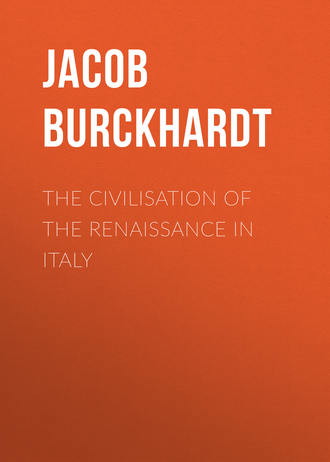 полная версия
полная версияThe Civilisation of the Renaissance in Italy
1263
From the stars, since Gauricus did not know physiognomy. For his own fate he had to refer to the prophecies of Cocle, since his father had omitted to draw his horoscope.
1264
Paul. Jov. l. c. p. 100 sqq. s. v. Tibertus.
1265
The most essential facts as to these side-branches of divination, are given by Corn. Agrippa, De Occulta Philosophia, cap. 57.
1266
Libri, Hist. des Sciences Mathém. ii. 122.
1267
‘Novi nihil narro, mos est publicus’ (Remed. Utr. Fort. p. 93), one of the lively passages of this book, written ‘ab irato.’
1268
Chief passage in Trithem. Ann. Hirsaug. ii. 286 sqq.
1269
‘Neque enim desunt,’ Paul. Jov. Elog. Lit. p. 150, s. v. ‘Pomp, Gauricus;’ comp. ibid. p. 130, s. v. Aurel. Augurellus, Maccaroneide. Phant. xii.
1270
In writing a history of Italian unbelief it would be necessary to refer to the so-called Averrhoism, which was prevalent in Italy and especially in Venice, about the middle of the fourteenth century. It was opposed by Boccaccio and Petrarch in various letters, and by the latter in his work: De Sui Ipsius et Aliorum Ignorantia. Although Petrarch’s opposition may have been increased by misunderstanding and exaggeration, he was nevertheless fully convinced that the Averrhoists ridiculed and rejected the Christian religion.
1271
Ariosto, Sonetto, 34: ‘Non credere sopra il tetto.’ The poet uses the words of an official who had decided against him in a matter of property.
1272
We may here again refer to Gemisthos Plethon, whose disregard of Christianity had an important influence on the Italians, and particularly on the Florentines of that period.
1273
Narrazione del Caso del Boscoli, Arch. Stor. i. 273 sqq. The standing phrase was ‘non aver fede;’ comp. Vasari, vii. 122, Vita di Piero di Cosimo.
1274
Jovian. Pontan. Charon, Opp. ii. 1128-1195.
1275
Faustini Terdocei Triumphus Stultitiae, l. ii.
1276
E.g. Borbone Morosini about 1460; comp. Sansovino, Venezia l. xiii. p. 243. He wrote ‘de immortalite animæ ad mentem Aristotelis.’ Pomponius Lætus, as a means of effecting his release from prison, pointed to the fact that he had written an epistle on the immortality of the soul. See the remarkable defence in Gregorovius, vii. 580 sqq. See on the other hand Pulci’s ridicule of this belief in a sonnet, quoted by Galeotti, Arch. Stor. Ital. n. s. ix. 49 sqq.
1277
Vespas. Fiorent. p. 260.
1278
Orationes Philelphi, fol. 8.
1279
Septimo Decretal. lib. v. tit. iii. cap. 8.
1280
Ariosto, Orlando, vii. 61. Ridiculed in Orlandino, iv. 67, 68. Cariteo, a member of the Neapolitan Academy of Pontanus, uses the idea of the pre-existence of the soul in order to glorify the House of Aragon. Roscoe, Leone X. ed. Bossi, ii. 288.
1281
Orelli, ad Cic. De Republ. l. vi. Comp. Lucan, Pharsalia, at the beginning.
1282
Petrarca, Epp. Fam. iv. 3, iv. 6.
1283
Fil. Villani, Vite, p. 15. This remarkable passage is as follows: ‘Che agli uomini fortissimi poichè hanno vinto le mostruose fatiche della terra, debitamente sieno date le stelle.’
1284
Inferno, iv. 24 sqq. Comp. Purgatorio, vii. 28, xxii. 100.
1285
This pagan heaven is referred to in the epitaph on the artist Niccolò dell’Arca:
‘Nunc te Praxiteles, Phidias, Polycletus adoraMiranturque tuas, o Nicolae, manus.’In Bursellis, Ann. Bonon. Murat. xxiii. col. 912.1286
In his late work Actius.
1287
Cardanus, De Propria Vita, cap. 13: ‘Non pœnitere ullius rei quam voluntarie effecerim, etiam quæ male cessisset;’ else I should be of all men the most miserable.
1288
Discorsi, ii. cap. 2.
1289
Del Governo della Famiglia, p. 114.
1290
Comp. the short ode of M. Antonio Flaminio in the Coryciana (see p. 269):
Dii quibus tam Corycius venustaSigna, tam dives posuit sacellum,Ulla si vestros animos piorumGratia tangit,Vos jocos risusque senis facetiSospites servate diu; senectamVos date et semper viridem et FalernoUsque madentem.At simul longo satiatus ævoLiquerit terras, dapibus DeorumLætus intersit, potiore mutansNectare Bacchum.1291
Firenzuola, Opere, iv. p. 147 sqq.
1292
Nic. Valori, Vita di Lorenzo, passim. For the advice to his son Cardinal Giovanni, see Fabroni, Laurentius, adnot. 178, and the appendices to Roscoe’s Leo X.
1293
Jo. Pici Vita, auct. Jo. Franc. Pico. For his ‘Deprecatio ad Deum,’ see Deliciae Poetarum Italorum.
1294
Orazione, Roscoe, Leone X. ed. Bossi viii. 120 (Magno Dio per la cui costante legge); hymn (oda il sacro inno tutta la natura) in Fabroni,’ Laur. adnot. 9; L’Altercazione, in the Poesie di Lor. Magn. i. 265. The other poems here named are quoted in the same collection.
1295
If Pulci in his Morgante is anywhere in earnest with religion, he is so in canto xvi. str. 6. This deistic utterance of the fair pagan Antea is perhaps the plainest expression of the mode of thought prevalent in Lorenzo’s circle, to which tone the words of the dæmon Astarotte (quoted above p. 494) form in a certain sense the complement.

